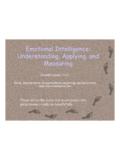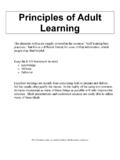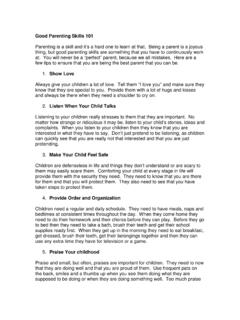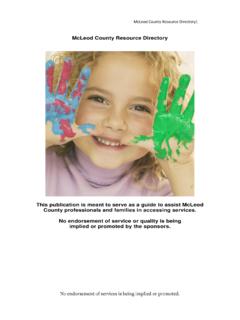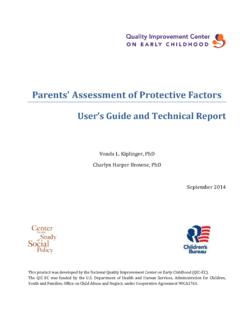Transcription of How to seriously evaluate your camp outcomes
1 How to seriously evaluate your camp outcomesRandall Grayson, , developmental, & organizational psychology applied to utilize the audio that accompanies this presentation in order to benefit fully. Randall Grayson, of the session Overview of the evaluation process Understanding of key issues and concerns Be a good consumer of evaluative information Learn how to hire an evaluator Time for questions and discussionPlease ask questions as we go alongI applaud you for being here Randall Grayson, / Caveats Part of a trilogy of sessions How to seriously evaluate your outcomes Measuring the softer outcomes Process and implementation evaluation Can t tell you everything you need to know Evaluation is not quick, simple, or easy Randall Grayson, on evaluationGeneral Texts Cambell, D.
2 T. (1998). Social Oaks, CA: Sage Publications. Chelimsky, E., & Shadish, W. R. (1997). Evaluation for the 21st century: A Oaks, CA: Sage Publications. Chen, H. (1990). Theory-driven Oaks, CA: Sage Publications. Fink, A. (1995). Evaluation for education and Oaks, CA: Sage Publications. Mohr, L. B. (1995). Impact analysis for program Oaks, CA: Sage Publications. Preskill, H., & Torres, R. T. (1998). Evaluative inquiry for learning Oaks, CA: Sage Publications. Orr, L. L. (1998). Social experiments: Evaluating public programs with experimental Oaks, CA: Sage Publications. Owen, J. (1999). Program evaluation: Forms and Oaks, CA: Sage Publications. Rossi, P. H., Freeman, H. E., & Lipsey, M W. (1998). Evaluation: A systematic Oaks, CA: Sage Publications. United Way of America.
3 (1999). Measuring program outcomes : A practical , VA: United Way of America. Randall Grayson, on evaluationSpecific How-to subject areas Bradley, W. J., & Schaefer, K. (1998). The uses and misuses of data and Oaks, CA: Sage Publications. Fink, A. (1998). Conducting research literature Oaks, CA: Sage Publications. King, J, Morris, L., & Fitz-Gibbon, C. (1987). How to assess program Oaks, CA: Sage Publications. Patton, M. Q. (1996). Utilization-focused evaluation: The new century Oaks, CA: Sage Publications. Sapsford, R. (1999). How to conduct Oaks, CA: Sage Publications. Tashakkori, A., & Teddlie, C. (1998). Mixed Oaks, CA: Sage Publications. Randall Grayson, sites of interest American Evaluation Evaluation Links from Claremont Graduate Evaluation United Randall Grayson, are your expectations?
4 Why are you here? Randall Grayson, ) Introduction i) Goals ii) Why evaluate ? iii) Problems with ways of knowing iv) What is still often unknown 2) Steps in the evaluative process i) Needs assessment ii) Understand completely what you do (a) Process maps / logic models (b) Theory-driven evaluation (c) Implementation evaluation iii) Pick which outcomes to evaluate iv) Design an evaluation plan / methods (a) Study design and methods (b) Sampling (c) Measures (d) Ethics and consent forms v) Conduct the evaluation vi) Analyze the results vii) Utilize and disseminate the results viii) Begin again continuously evaluate 3) Top 15 evaluation mistakes 4) How to hire an evaluator 5) Different roles for evaluators Randall Grayson, evaluate ?
5 Utilize results to: Improve how outcomes are addressed Start a change initiative Examine strengths and weaknesses and reasons for both Distribute results to: Recruit, retain, and motivate talented staff Enlist and motivate able volunteers Attract new participants Engage collaborators other agencies, parents, schools, etc. Garner support for innovative efforts Win designation as a model or demonstration site. Enhance public image Retain or increase funding Develop and justify budgetsHow do you know if you give kids a world of good or not? Randall Grayson, of outcomes Appreciation of diversity Communal orientation Conflict resolution skills Creativity Hope & goals (future sense of self) / sense of purpose Environmental attitudes, awareness, and behaviors Leadership Locus of control Moral reasoning / character / ethics / values , six pillars framework.
6 Trust, citizenship, fairness, respect, responsibility, & caring Extroversion Problem solving / planning Emotional intelligence(Assertiveness, responsibility, cooperation, self-control, emotional self-awareness, empathy, interpersonal relationships, social responsibility, problem-solving, reality testing, flexibility, stress tolerance, happiness, and optimism) Appropriate risk taking Receive positive attention / love / caring Fun General self-efficacy, independence, self-confidence Self-esteem / self-concept Self-discipline / delay gratification / restraint / impulse control / aka self-control Achievement motivation / success orientation Grades / cognitive development Behavior problems (externalizing and internalizing) Free-time activities at home Skill achievement or enhancement Friendship status (popular, neglected, rejected, controversial, average) Intergenerational relationships Health self-efficacy and behaviors Physical fitness Spirituality (Orients and gives meaning to our lives; Guidelines for living; Answer the question Why?)
7 For things like random nature of events, uncertainty of the future, and death)CognitiveEmotionalBehavioral Randall Grayson, of knowing Parents and campers tell meStories of how camp changed lives Because parents keep sending their kids back Measured actual behaviors Measured attitudes and mental states Randall Grayson, with ways of knowing Issues with qualitative data Sins of memory Social desirable responding Because of a camp s return rate Interventions that sometimes falter Valid and reliable information/data Randall Grayson, of memory (1 of 2) TransienceOver time, things are When did Jane change exactly? How much did Jane do ____ before camp? What exactly was Jane like before camp? Absent-mindedness Not paying close Camp program was not monitored closely.
8 Reliable identification of camp outcomes and what lead to each Misattribution Change occurred elsewhere (school, church, mentor, friend). Source DNA evidence vindicates conviction by eye-witnesses (90%)Commercials, depression, Gambler s fallacy, beauty and intelligence, etc SuggestibilityIncorporate information provided by others (marketing materials & director) Hypnosis, eye-witness testimony, leading questions, and reinterviewing Randall Grayson, of memory (2 of 2) BiasoMemory encoding and retrieval are highly dependent on, and influenced by, preexisting knowledge and much of perception depends upon why the parents sent their child to camp in the first oParent(s) like you and confound that with rating of their children are in a way also rating their own performance DissonanceoWhen given free choice and significant effort or money has been expended, people often believe their decisions and attitudes are said I like camp and I still To justify their decision to send their child to your camp and spend money on that decision, parents will believe camp was beneficial and worthwhile.
9 Randall Grayson, w/qualitative data final slide Social desirable respondingoTell you what you want to hear to be niceoDon t want to deal with confrontation, so avoid the issue CaveatoThis is not to say that all qualitative data iswrong or bad, but rather that there are criticalissues which limit our ability to have faith inthe results and determine appropriately, qualitative data is invaluableoInappropriate use may do more harm than good Randall Grayson, of camp s return rate Parents might send their children back to a camp for numerous reasons. They are not logical, bean counting psychometricians capable of accurately assessing all outcomes . IQ is most frequent assessment in the country, but teachersare poor predictors of it Self-esteem is most accurately assessed by the person, not others Even if parents were accurate predictors of outcomes , the model would be complex and different for every parent.
10 (A)return decision = .43fun, .12 self-esteem, .27 safety, .18 liked director(B)return decision = .21fun, .24 extroversion, .55 friends returning(C)return decision = .36 environmental attitudes, .41 EQ, .23 creativity(D)return decision = .36fun, .22 liked director, .42 don t want to pick The items in the equation and their accuracy would vary widelyanother camp Randall Grayson, that sometimes falter School Religion Camps Randall Grayson, and reliable information ValidoWhat you are attemptingto measure is what is actuallybeing measuredoThe assessment can discriminate between groups and predict future outcomes and behaviors ReliableoWhen the outcome is assessed again in a short period of time, stable outcomes should remain largely the same (self-esteem), and unstable outcomes should vary (mood).
